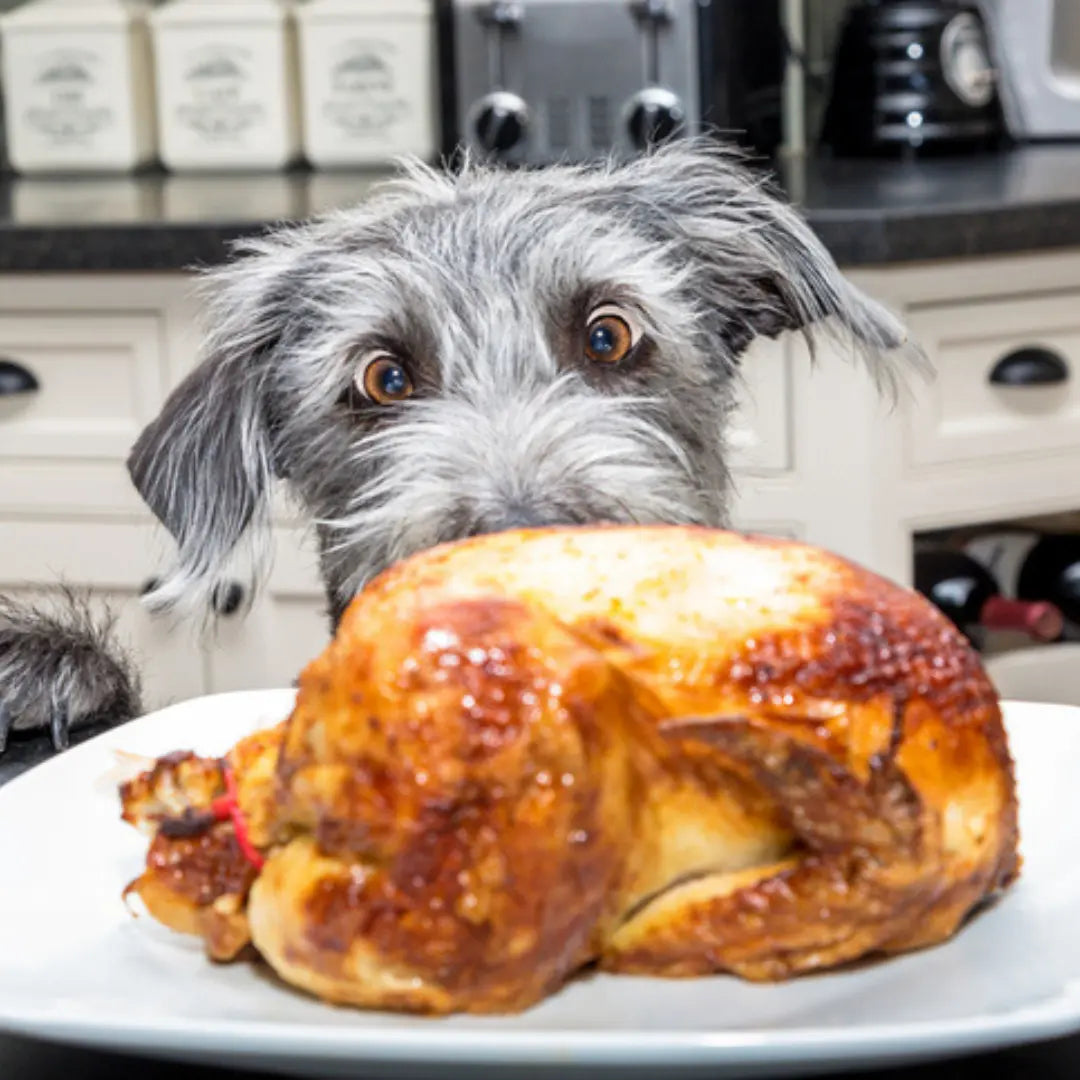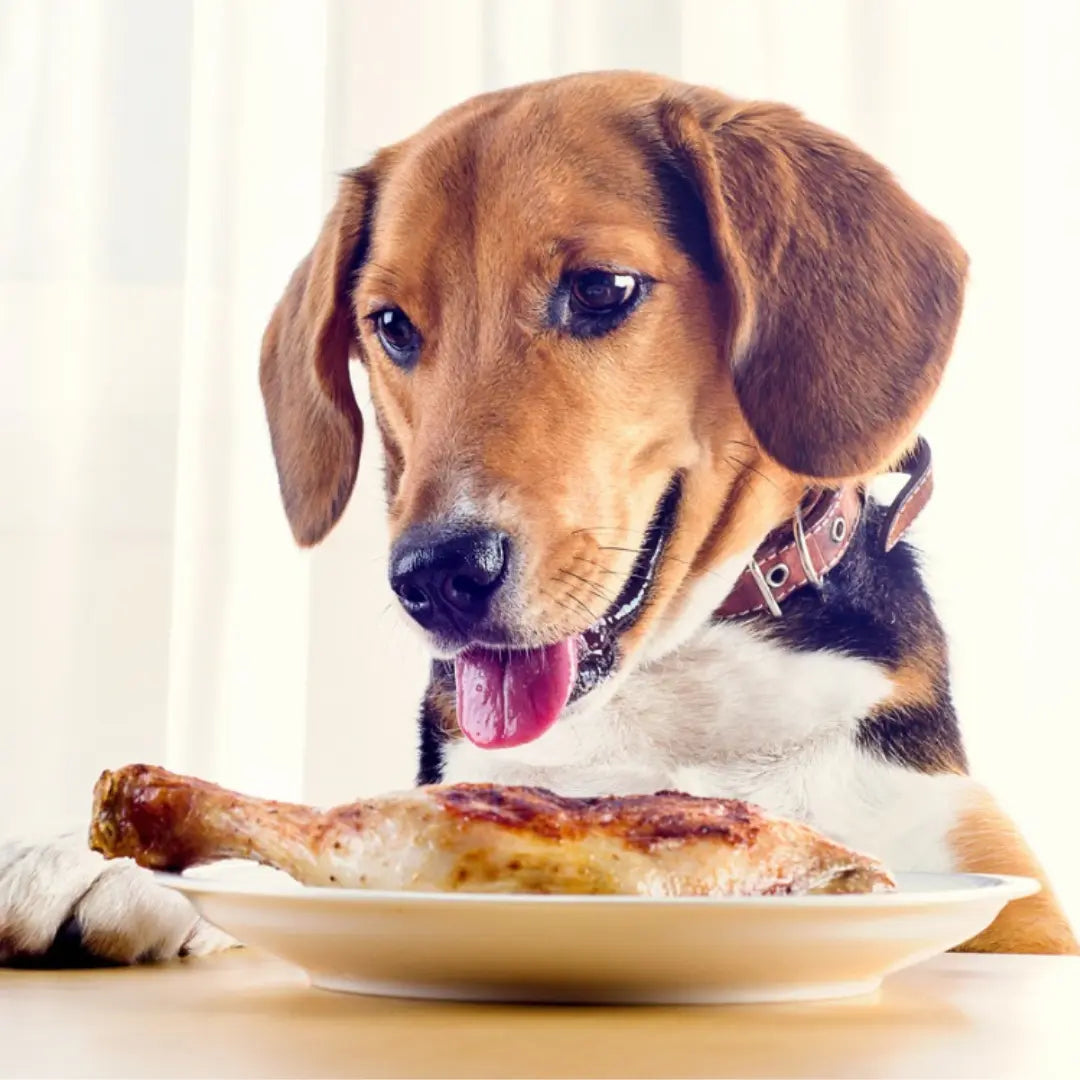Turkey Talk: Is it Safe to Share Your Holiday Feast with Your Dog?
Can Dogs Eat Turkey?
As the holiday season approaches, many pet owners ponder whether it's safe to share a bit of their Thanksgiving turkey with their dogs. After all, our pups are considered part of the family, and including them in festive meals seems like a natural instinct. Yes, in moderation. Turkey is a good source of protein for dogs, and it can be a tasty addition to their diet. However, there are some important things to keep in mind when giving your dog turkey. Let’s take a look at the benefits of adding turkey to your dog’s diet, as well as some delicious recipes you can make that incorporate turkey.

The Benefits of Turkey for Dogs
Turkey is an excellent source of protein. Protein is an essential nutrient that helps build and repair muscle tissue, and it also provides energy for daily activities. In addition, protein helps support your dog's immune system and keeps their skin and coat healthy.
Turkey also contains many essential vitamins and minerals like B vitamins, phosphorus, iron, zinc, selenium and potassium. It’s also an excellent source of omega-3 fatty acids which help keep their skin and coat healthy. It contains high levels of essential amino acids and nutrients such as vitamins B6 and B12, niacin, phosphorus, and selenium, all of which aid in muscle development and energy production and can significantly contribute to your dog's overall pet health. It is also a great source of zinc which helps support the immune system and promote skin and coat health. Turkey is a lean white meat that is low in fat and calories so it can be a great alternative to fattier meats if your pup needs to watch his weight.
Introducing Turkey to your Dog’s Diet
As with any new food item, it's important to introduce turkey into your dog's diet gradually over the course of several days or weeks. This will give you ample time to watch for any potential signs of intolerance or an allergic reaction (e.g., diarrhea, vomiting). Additionally, when feeding your pup cooked turkey from the grocery store make sure it is not deli meat and does not contain additives such as salt or spices that could potentially cause an upset stomach or other digestive issues. Also, never feed your pup raw turkey as this can lead to serious illness including salmonella poisoning if not handled properly. Lastly, be careful not to feed cooked turkey bones to your pooch, they can be a choking hazard or splinter and cause health problems.
Adding lean proteins like turkey to your dog’s diet can be beneficial in many ways. Not only does it provide them with essential nutrients like protein but it also adds variety to their meals which can help prevent boredom from eating the same food every day! If you want to give your pup something special this holiday season, consider making them one of these delicious homemade recipes that incorporate fresh ingredients and lean proteins like turkey! Just remember to always ask your vet before adding anything new to your pet's diet.
Stay Up To Date

Recipes for Dogs with Turkey
One great way for pet parents to introduce turkey to their dog’s diet is by preparing homemade dog food with lean proteins like turkey breast or ground turkey. You can also add cooked vegetables to the turkey meat like carrots or green beans to provide additional vitamins and minerals. Here are two simple Dog Child recipes you can try at home:
Turkey Meatballs – This recipe has natural ingredients, the meatballs can be served as a whole meal or as a meal topper. Real turkey is a great source of lean protein, while the oats are packed with fiber and are good for pups with digestive issues. Cooking with human grade ingredients is always best, as it ensures that your pup is getting the nutrients they need while avoiding any potential preservatives or additives.
Chop cranberries and green beans (or toss into a food processor)
Gather all of your ingredients and add everything into the mixing bowl.
Use clean hands to mix it all up until the mixture looks uniform.
Using a small scoop, portion out the meatball mixture. And roll them into small balls on your lined baking sheet.
Bake at 350 for 25 minutes until turkey is thoroughly cooked.
Let Cool and Serve!
Turkey Pumpkin Squares – These turkey and pumpkin meal squares are so easy to make and perfect for meal prep for your dog. Featuring our Dog Child Grain Free Meal Mix, Ground Turkey and pumpkin, these are jam-packed full of flavour and nutrients perfect for your pup.
Cook your ground turkey and add in your Dog Child Grain Free Meal Mix according to the package directions
Add mixture into a square pan and press down to ensure it is compact
Add pumpkin on top
Pop in the freezer for 1-2 hours, cut into squares and let your pup enjoy!
Another Dog Child Recipe is our Ground Turkey & Oats! Simple yet nutritious! For full recipe check out our website!
Turkey as a Protein Source for Dogs
Dogs rely heavily on a protein-rich diet, and turkey can serve as an excellent source of this essential nutrient. Protein plays a pivotal role in your dog's health, supporting muscle maintenance, immune function, and providing them with the energy they need to stay active. Including turkey in your dog's diet, when done correctly, can offer a delicious and nutritious addition to their meals.
Turkey Parts to Include and Avoid
Not all parts of the turkey are equally safe or suitable for your canine companion. Here's what you need to know:
Lean Meat vs. Skin and Bones: It's advisable to opt for lean, boneless turkey meat when sharing with your dog. Any presence of poultry bones must be meticulously removed from the turkey, as they can pose a grave risk of intestinal blockage or injury to your dog's delicate digestive tract.
Risks of Turkey Skin: Although some dogs may tolerate small amounts of turkey skin, it's generally best to avoid it due to its high fat content. Overconsumption of fat can lead to issues related to the pancreas and other associated health conditions.
Dog Child Meal Mixes
If you’re looking for a quick way to add more nutrients to your dogs Turkey meal, try Dog Child’s Organic Oats & Berries Meal Mix or Grain Free Meal Mix today! You simply rehydrate with water and mix in with your dog’s ground protein of choice - voila you have a homemade meal for your dog. You can either use a complete and balanced meal or mix it into your dog’s regular food as a topper. Get your paws on one of our Meal Mixes today.
Preparing Turkey for Dogs
Proper preparation is a critical aspect when it comes to offering turkey to your canine friend:
Cooking Methods: Ensure the turkey is cooked thoroughly, and refrain from using any seasonings or additives that are commonly found in human foods. Your dog's digestive system is best suited for plain, unseasoned turkey.
Portion Control: When serving turkey to your dog, practice moderation. It should be presented in small quantities and considered an occasional treat rather than a regular component of their daily diet. This approach helps prevent overindulgence and potential digestive issues.
Potential Risks and Health Considerations
While turkey can provide health benefits, it's vital to remain vigilant about potential risks and health considerations:
Food Allergies: Some dogs may possess allergies or sensitivities to turkey, so it's crucial to monitor your dog for any adverse reactions after consumption.
Pancreatic Issues: The high-fat content in turkey skin can potentially lead to a condition known as pancreatitis, which is both painful and serious for dogs.
FAQ
Can Dogs Have Turkey Breast?
Yes, dogs can eat turkey breast meat as long as it is plain, cooked, and free from any seasonings, spices, or sauces. Turkey breast is a lean source of protein, which is beneficial for dogs. However, it's important to follow these guidelines:
Remove Bones: Always ensure that the turkey breast is boneless. Poultry bones can splinter and pose a choking hazard or cause intestinal blockage, which is dangerous for dogs.
No Seasonings: Do not season the turkey breast with ingredients like garlic, onions, salt, or other seasonings, as these can be harmful to dogs.
Moderation: Offer only small, bite-sized portions of plain, cooked turkey breast as an occasional treat. Avoid making it a significant part of your dog's regular diet to prevent potential digestive issues.
Can Dogs Have Ground Turkey?
Dogs can safely have lean, boneless, and well-cooked ground turkey as part of their diet. Avoid seasoning, spices, or sauces, and ensure it's free of poultry bones that can pose a choking hazard. Feed ground turkey in small, appropriate portions based on your dog's size and needs, while monitoring for allergies or digestive issues. Opt for high-quality, lean ground turkey without additives. Remember that ground turkey should complement, not replace, a balanced dog food or prescribed diet, so consulting your veterinarian for guidance is essential.
Can My Dog Have Thanksgiving Leftovers?
Dogs can have plain, unseasoned turkey leftovers in moderation. Avoid giving them seasoned or heavily spiced leftovers.
Is Turkey Safe for Dogs with Allergies?
Some dogs may have allergies or sensitivities to turkey, so it's essential to monitor for any adverse reactions after consumption.
How Much is Too Much Turkey
A general rule of thumb is that treats like turkey should make up no more than 10% of a dog's daily calorie intake. However, specific portion sizes vary based on your dog's size, age, and activity level, so consult your veterinarian for personalized guidance to avoid overfeeding.
What should I do if my dog experiences digestive issues after eating turkey?
If your dog shows signs of digestive problems after consuming turkey, consult your veterinarian for guidance and proper evaluation.
Conclusion
In summary, feeding turkey to your dog can be a safe and beneficial practice when approached with care. Avoiding bones and skin, serving turkey in small, unseasoned portions, and ensuring moderation are key principles to follow. Your dog's health should always be a top priority, and consulting your veterinarian for dietary advice and guidance is advisable if you have concerns. By adhering to these guidelines, you can safely incorporate turkey into your dog's diet, contributing to their digestive system's well-being and overall health. Remember that mindful choices and responsible feeding practices are fundamental to ensuring a joyful and healthy pup.











